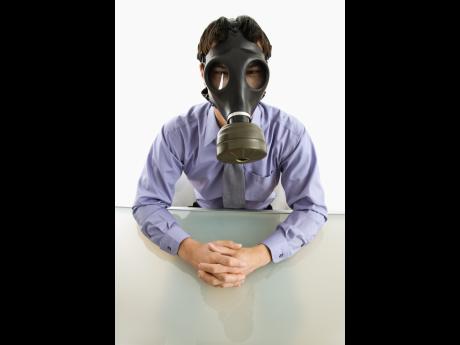Dear Doc | My boyfriend's breath stinks!
Q Dear Doc, I need your help. Please don't think I am wicked but... My boyfriend's breath stinks! It smell so bad, sometimes kissing him makes me sick. But He brushes his teeth everyday, so what could be the problem? Please tell me what I can do or give him to fix this problem.
A The medical term for what your boyfriend has is called halitosis. It is defined as malodor with intensity beyond a socially acceptable level perceived. It is a common condition, and many persons are not aware of their own bad breath and have to learn of it from another person.
Everyone suffers from halitosis at some point in time. This is called physiologic halitosis, and refers to bad breath that does not have a specific cause; for example when you wake up in the morning (morning breath) or after eating certain types of foods such as garlic or onion. In these common cases, the halitosis disappears after adequate oral hygiene.
However, persistent halitosis, which occurs for the whole day or for an even longer period of time, can cause serious problems, and is known as pathologic halitosis, which is bad breath that results from a specific identifiable cause. It is a significant concern for many individuals and can negatively affect their quality of life and personal relationships.
Majority of cases of halitosis, arise from intraoral (inside the mouth) causes. Oral malodor is associated with poor oral hygiene and gum disease (gingivitis and periodontitis), however, persons without these conditions can sill have halitosis. Bad breath is caused by bacteria acting on material between the teeth, and on debris on the tongue resulting in the release of malodorous, volatile sulphur compounds - mainly hydrogen sulfide and methyl mercaptan. The tongue is particularly important in cases of bad breath, because it's many creases and crevices provide a favorable environment for the growth of odor-causing bacteria. Dry mouth, dental abscesses, chronic tonsillitis, unclean dentures, sinusitis, and sinus infection, also contribute to bad breath.
Successful halitosis treatment begins with the right diagnosis, finding out the cause of the bad breath, and treating the cause. This will require a clinical assessment by a professional. Whenever the cause of the halitosis originates from the oral cavity (mouth), reduction in the amount of oral bacteria is essential. Therefore, good oral hygiene and treatment of any inflammatory conditions is essential. You will have to consult your dentist for the right approach to this.
If there is no specific cause identified for the bad breath, many persons can improve their breath with:
- Sugar-free chewing gums that stimulate saliva production.
- Good hydration, and keeping the oral cavity (mouth) moist.
- Reducing alcohol and coffee intake.
- Proper dental care and oral hygiene, including daily flossing and cleaning of the tongue.
- Rinsing and gargling with an alcohol-free mouthwash.Since much of the odor is associated with the back of the tongue, it is also important to gargle in addition to oral rinsing.
Finally something interesting to note about mouthwash:
The best time to use a mouthwash is before bedtime. The residue of the mouthwash will remain in the mouth for a longer period of time and have a greater effect. In addition, bacterial activity that leads to bad breath is greatest during sleep.
Most interesting of all, however, is that the active agents in many mouthwashes may be inactivated by the detergents in toothpastes; so persons with halitosis should be advised to use mouthwash an hour or more after brushing their teeth.
Cure for the hiccups
Q Dear Doc, I keep getting hiccups. They are very annoying at times, especially when I am at work and I cannot carry on a conversation. What is causing this and how can I stop it from happening?
A Hiccups happen when the muscle that separates your chest from your belly (your diaphragm), suddenly contracts. When that happens, it causes you to take in air, and as a result your voice box closes shut, which is what causes the 'hic' sound.
Most episodes of hiccups last less than 48 hours. Rarely, they can last longer. In most cases, hiccups go away on their own with no lasting effects. But in some people, they can last a long time and lead to problems.
The most common causes of hiccups are:
- Having an overly full stomach.
- Drinking soda or other fizzy drinks.
- Swallowing air (for example when chewing gum).
There are a few things you can try to get rid of your hiccups such as:
- Holding your breath for a few seconds (30) or longer.
- Corking your nose, closing your mouth and breathing out, the way you would to pop your ears on an airplane.
- Stimulating the back of your throat, by gulping cold water, gargling with water, or swallowing a teaspoon of sugar.
- Pulling your knees up to your chest and leaning forward.
See your doctor or nurse if you have hiccups that last longer than 48 hours.

